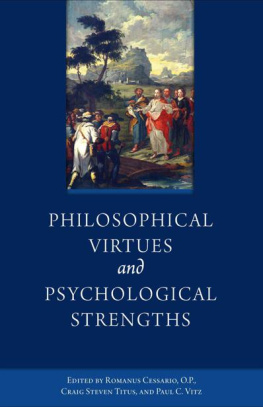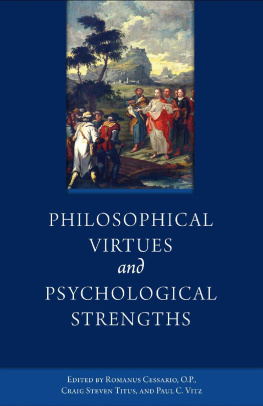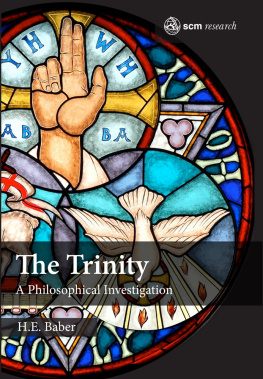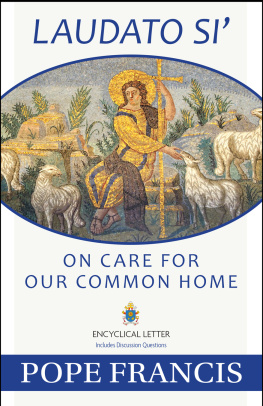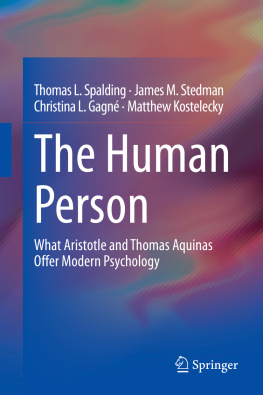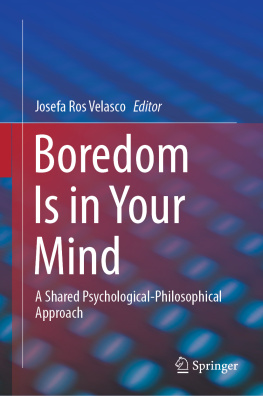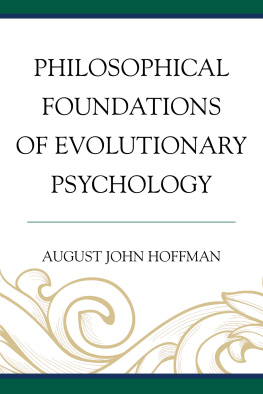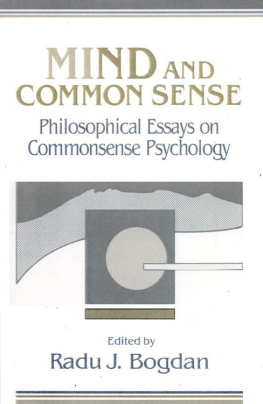Philosophical Virtues and
Psychological Strengths
Building the Bridge
Edited by
Romanus Cessario, O.P.,
Craig Steven Titus,
and
Paul C. Vitz
SOPHIA INSTITUTE PRESS
Manchester, New Hampshire
Copyright 2013 The Institute for the Psychological Sciences
Printed in the United States of America
All rights reserved
Cover design by Carolyn McKinney
On the cover: Healed Ten Lepers (82522030), Zvonimir Atletic,
used under license from Shutterstock.com.
No part of this book may be reproduced, stored in a retrieval system, or transmitted in any form, or by any means, electronic, mechanical, photocopying, or otherwise, without the prior written permission of the publisher, except by a reviewer, who may quote brief passages in a review.
Sophia Institute Press
Box 5284, Manchester, NH 03108
1-800-888-9344
www.SophiaInstitute.com
Sophia Institute Press is a registered trademark of Sophia Institute.
Library of Congress Cataloging-in-Publication Data Philosophical virtues and psychological strengths : building the bridge : / edited by Romanus Cessario, O.P., Craig Steven Titus, and Paul C. Vitz. pages cm Includes index. ISBN 978-1-933184-91-3 (pbk. : alk. paper)
ePub ISBN 978-1-622821-60-0
1. Virtues. 2. Virtue. 3. Psychology, Religious. 4. Psychology and
religion. I. Cessario, Romanus, editor of compilation. BJ1589.P45 2013 179'.9 dc23 2013000535
Contents
Part I: Introduction
, b y Romanus Cessario, O.P.
, by Kenneth Schmitz
Part II: Basic Elements
, by Christopher J. Thompson
, by Matthew Cuddeback
, by John A. Cuddeback
, by Craig Steven Titus
, by Tobias Hoffmann
, by Paul Gondreau
, by Daniel McInerny
, by J. David Franks
Part III: Connections
, by Roger Scruton
, by Benedict M. Ashley
, by Paul C. Vitz
Part I
Introduction
Chapter 1
Fresh Beginnings from Classical Foundations
Romanus Cessario, O.P.
Faith and reason
Psychology and religion enjoy a relationship that converges on the point that defines the capacity of the human person to reach out for transcendence. The competing claims sometimes advanced by authors from within these two disciplines form the background for several well-known debates that have occurred, during the twentieth century especially. At times, antagonisms even erupted. The Catholic Church, to cite one example, maintained a highly standoffish position with respect to the proposals advanced by Sigmund Freud and other early clinical theorists, especially when these hypotheses touched upon the place that moral truth holds in the life of the human creature. See, for example, Pope Pius XIIs reprobation of the pansexual method of a certain school of psychoanalysis during his address to the First International Congress on the Histopathology of the Nervous System. While many religious persons now accept the general practices of clinical psychology, this does not mean that fundamental agreement exists among them about what service psychology may render toward the pursuit of a happy human life. Still, it is the case that psychology and religion address, from perspectives proper to their first principles, basic questions about what it means to exist in the world as a human person. That those diverse starting points may eventually lead to diverse, and even contradictory, conclusions about important features of human existence should cause no surprise. Consider, for instance, the different views that religious believers and secular psychologists may hold about the value of exorcism to alleviate pathological symptoms or the power of prayer to ameliorate personal difficulties.
In principle, there is no reason to assume that psychology and religion must follow conflicting trajectories. Bridge-building is possible. The present volume represents an effort, not to complete the bridgeworks, but to establish the foundations for a fruitful, bridge-building dialogue between speculative thinkers and clinical psychologists. Perhaps a better metaphor would be to find a path through the waters of the Red Sea. Just as Moses led the Chosen People into the land flowing with milk and honey, psychology in its modern exposition seeks to lead people away from the slavery imposed by all kinds of personal disorders into a place where human happiness flourishes. This passage through the waters does not entail a destruction of the human person, but rather brings about liberation from those disorders that enslave. Biblical commentators recognize such disorders allegorically represented by the conditions of life imposed in Egypt on the Chosen People. Respect for the basic structure or nature of the human person, created in the image of God, dominates the biblical tradition. Christian theology thus proceeds on the assumption that nothing authentically human remains excluded a priori from incorporation into the body of knowledge that finds its origin in divine revelation.
The specific warrant for this claim flows from belief in the Incarnation of the Son of God. Orthodox Christians hold that the Second Person of the Blessed Trinity took to himself a complete human nature, unique in that it is united to his divine nature. Since the fifth century, the Church has officially termed this union of a concrete individual human and a divine nature in the person of Christ hypostatic . This union begins at the moment of Christs conception in the womb of the Blessed Virgin Mary a conception that occurs outside the ordinary way of human procreation and so leaves the Mother of the Redeemer without loss of her virginity. The Christian Church thus recognizes in the Incarnate Son the perfect realization of what it means to be human, or as the Scriptures say, one who has similarly been tested in every way, yet without sin (Heb. 4:15).
Theologians attuned to the great Christian tradition agree that the benefits Christ brings transcend the perfections that result from the ordinary human development of our natural capacities. Life everlasting for those who leave this world in Gods friendship brings with it a promise of divine communion and Beatific Vision that exceeds the highest expectations and abilities of the human race. This bright promise casts its light onto the world here below. Even now, the grace of Christ transforms those persons who remain united with the Savior, making them active images of God.
It is difficult to ponder the mystery of the Incarnation, for example, as described in the Liturgy of the Christmas season, without contemplating the mystery of divine transformation that the Incarnation of the Son of God holds out as possible for every human being. Thus the Church prays, God our Father, through your Son you made us a new creation. He shared our nature and became one of us; with his help, may we become more like him.
To bring this distinctive announcement into the world, which properly occurs only through an officially deputed preacher, the Christian Church relies on an instruction that surpasses what is available to the ordinary ways of human knowing. Divine revelation makes known to the human race a teaching about God and the way to God that surpasses the choicest expressions of human wisdom. Because the way to God engages the actions of free agents for divine communion and beatific friendship are open only to intelligent creatures, that is, to angels and men divine revelation extends to providing instruction about the human person and his or her actions. Anthropology, psychology, and ethics remain legitimate philosophical disciplines and initiate authentic philosophical lines of inquiry. The same inquiries, however, complemented by the findings of empirical and statistical sciences, may be taken up by a higher discipline or science such as theology. The Catholic tradition situates theology within the sacra doctrina , or holy teaching. Theology thus draws from the very knowledge that God possesses of himself and of all that exists. The privileged communication of this sacra doctrina is called revelation, and the equally privileged reception of this divine knowledge occurs, at least systematically, in the discipline that we call theology, the science of faith and of the saints of faith.
Next page
